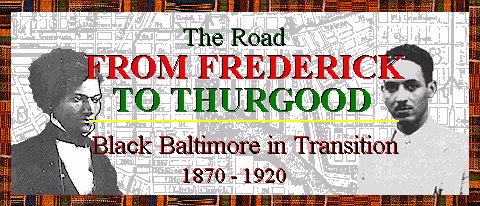 |
"Much Higher Than Money Or Trivial Consideration":The Campaign of 1897, Part 4 |
 |
"Much Higher Than Money Or Trivial Consideration":The Campaign of 1897, Part 4 |
Yet, as the deadline neared, George Lane and the rest of the black mugwump ticket, campaigned as if they expected to be placed on the ballot. Most of the ticket was present at a reception held on the evening of October 19, 1897, at the headquarters of the Citizens Committee, 310 St. Paul Street. "I seek no social equality for the negro [sic]," explained Lane, drawing from a theme popularized by such contemporaries as Booker Taliferro Washington, "I ask only that he shall be granted that political recognition to which his position as an American citizen entitles him." Other speakers/would-be candidates at the reception likened electoral victory to a male rite of passage -- "the just reward of political manhood." Certainly, at this juncture, late-October 1897, optimism was high. In fact, several community-based Republican clubs were reported as having endorsed the black ticket.
Two days after the reception at Committee of One Hundred headquarters, the independents' fears were realized as John C. Rose, counsel to the board of election supervisors, disqualified the petition papers filed by the black independents. Of the 671 signatures gathered by the organizers and supporters of the black independent movement, Rose challenged 420 as invalid, leaving the petition 49 signatures short of the requisite 300. In Baltimore County too, where an independent movement of black republicans akin to Baltimore City's Citizens Committee of One Hundred was underway, petitions were deemed invalid. The news of the disqualification came mere hours before the submission deadline and thus last-minute manuevers toward compliance were futile. Alas, the campaign died on technicalities.
When would-be mayoral candidate George Lane received word that the ticket had been disqualified, his reaction was suprisingly sedate. While many the independent activists had foretold of a "mandate" against the black mugwumps, some even predicting correctly the weapon of their demise, Lane comments were more of a frustrated nature than a dissappointed one. Perhaps, with all the dissention among the black leadership elite, he had concluded well before that moment that his battle had minimal chance of success. Or perhaps, victory on election day 1897 was not his only goal. Nearly a week passed before the Citizens' Committee of One Hundred released an official statement of the disqualification and the approaching election. Rather than cry foul, the statement was a recommittment to the spirit of their cause. "We shall wage a ceaseless warfare [sic] against the [Republican] party until we are in full posession of every right guaranteed by the law of the land," the Committee proclaimed. In their view party affiliation was an antiquated and misleading approach to equality for blacks as, "the right of franchise is not founded on party, but on American citizenship." "For this reason," they claimed, "we should vote for our best interests [not any party line]." As for recent allegations that their movement was financed by the local Democrat Party, the Citizens' Committee stated, "we have received not one cent from any Democrat on earth...Our motive is much higher than money or trivial considerations."
The black mugwump episode of 1897, at once, marked a beginning and an end. It signalled the end of nearly three decades of blind allegiance to the Republican Party (or any other for that matter). Truly, by this time, the energy displayed at the
Copyright: Maryland State Archives, 1997